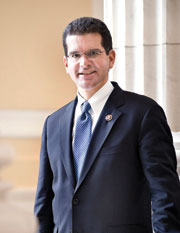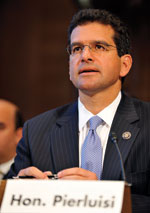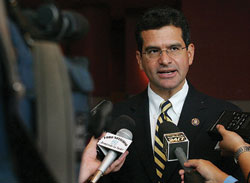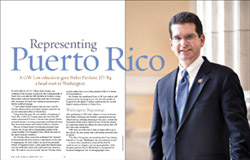Representing Puerto Rico
A GW Law education gave Pedro Pierluisi, JD '84, a head start in Washington.
When Pedro Pierluisi was confirmed as the secretary of justice for the Commonwealth of Puerto Rico soon after his 34th birthday, he looked so young that political cartoons illustrated the early days of his tenure with caricatures of a small man holding an enormous gavel that he could not manage.
"I have always looked younger than my years," says Mr. Pierluisi, whose position as secretary of justice made him the top law enforcement officer in Puerto Rico.
During those four years, the now-resident commissioner of Puerto Rico to the U.S. Congress supervised more than 500 lawyers and recruited 50 more. It has also been reported that he increased criminal convictions, prosecuted more financial crimes than previous secretaries, and combated political corruption.
The son of former Puerto Rico Housing Secretary Jorge Pierluisi, the 51-year-old is a longstanding member of the commonwealth's New Progressive Party, which advocates for the island territory's statehood.
Mr. Pierluisi, whom many have nicknamed the "tsunami" for his powerful electoral victories, is also known for his style of campaigning. He used to dance on top of his motorcade vehicle to Reggaeton music—Latin reggae that blends reggae and dancehall-style sounds with traditional Latin American salsa. "My style is very extroverted," says Mr. Pierluisi, whose position makes him a non-voting member of the U.S. House of Representatives.
Mr. Pierluisi has transformed from a GW Law student, self-conscious about his strong accent, into the sole member of Congress for the island's 4 million residents and the second-highest-ranking politician in Puerto Rico.
Washington Beginnings
After graduating in 1981 with a degree in American history from Tulane University, Mr. Pierluisi considered several law school options, including returning to San Juan to attend the University of Puerto Rico School of Law. Of all the schools, his hometown institution offered the lowest tuition. But GW gave him some momentum.
"GW went out of the way to help me financially to go to law school," he says, noting that a scholarship motivated him to attend.
"The idea of living here was something that I was looking forward to," he says. "Washington was very attractive to me."
A moot court competition convinced him that he could succeed as a litigator, and serving as president of the International Law Society allowed him to incorporate his bicultural background into his emerging legal career.
And, even after 26 years, he still remembers the classes he took with professors David Seidelson (torts), Peter Raven-Hansen (civil procedure), Jerome Barron (constitutional law), and Roger Schechter (securities regulation), among others.
Living in Washington, D.C., also had its advantages. Mr. Pierluisi spent the summer after his first year at GW as a scholar in the LBJ Internship Program, which, before its elimination in 1994, provided congressional offices with funding to hire an intern for two months each year. He interned in the office of then-Puerto Rico Resident Commissioner Baltasar Corrada del Rio and served as a staff assistant for the commissioner during his second year of law school until his son was born in 1983.
 Courtesy Office of Pedro Pierluisi
Courtesy Office of Pedro PierluisiMr. Pierluisi spent his third year of law school working as a part-time law clerk at DLA Piper and accepted a full-time offer to begin after he took the bar. "I had a scholarship and student loans but was married and had to work to earn a living," he says.
After a year, Mr. Pierluisi received a call about an opening at international law boutique Cole Corette & Abrutyn. The firm was representing Minpeco S.A., a Peruvian international metals and minerals trading company, in a suit pending in the Southern District of New York about the manipulation of the world silver market. They needed a bilingual attorney.
"I thought that was a great opportunity to use my Spanish in a Latin American matter," he says.
He spent four years at Cole Corette traveling between Peru, New York, and Washington on a variety of issues, including the preparation of all Peruvian witnesses.
After assisting the partners at trial, the team secured a $197.1 million treble damages verdict for its client. When the trial ended in August 1988, Mr. Pierluisi had three children and was considering a return to San Juan to raise his family.
He took the bar in Puerto Rico in August 1989 and passed, but says he "was overqualified to find a comparable job in the major firms there."
"I decided to go on my own because every time I have had a challenge, I have gone for it," he says.
A Return Home
In May 1990, Mr. Pierluisi started a law firm with his older brother, Jorge. Quickly, he retained clients concentrating on federal and state litigation, including a major insurance company. The firm grew into a five-lawyer practice over the next few years, handling issues ranging from personal injury and contracts to real estate and high-profile litigation.
As he continued to grow his practice, the congressman developed a vibrant presence in local politics. Given his lineage, Mr. Pierluisi was well known for his association with the statehood movement. He actually introduced legislation to provide for a referendum that would allow Puerto Ricans to determine the commonwealth's political status. He received 181 co-sponsors, which was 52 more than his predecessor received after introducing similar legislation. Mr. Pierluisi's bill passed the house in April 2010 with a vote of 223-169.
His tenacity catapulted him into the spotlight after the 1992 election of Pedro Rosselló as governor of Puerto Rico. As governor-elect, Mr. Rosselló asked Mr. Pierluisi, then 33 years old, to work on the transition team for the Department of Justice.
"Gov. Rosselló was so pleased with my work on the transition that he asked me to become the deputy secretary of justice of Puerto Rico," Mr. Pierluisi says.
When the Senate of Puerto Rico failed to confirm the governor's choice for secretary of justice, Mr. Pierluisi assumed the role of acting secretary. Mr. Rosselló nominated him to be secretary and the Senate of Puerto Rico unanimously confirmed him in June 1993.
"I had this feeling that life was going very fast," he says. Tragically, life soon came to a halting stop. A year and a half after he took office, Mr. Pierluisi's 28-year-old brother, José Jaime Pierluisi, an adviser to Mr. Rosselló, was murdered during a carjacking in front of his home on June 7, 1994.

Pedro Pierluisi represents 4 million residents of Puerto Rico as a non-voting member of the U.S. House of Representatives.
Courtesy Office of Pedro Pierluisi
With a renewed focus on crime driving his administration, Mr. Pierluisi helped Mr. Rosselló secure the commonwealth's designation as a "high-intensity drug trafficking area," which qualified it for millions of dollars in federal funding. Also, as an active member of the National Association of Attorneys General, he served as the chairperson of the eastern region.
Despite his success in government, he returned to private practice after Mr. Rosselló's first term in office and became a partner at O'Neill and Borges, the third-largest law firm in Puerto Rico. "They had never before hired a lateral capital partner," he recalls, adding that he had no clients. During his 10 years with the firm, he grew his litigation and government affairs practice dramatically.
During this period, he also served as a director of the University of Puerto Rico Foundation, the Puerto Rico Homebuilders Association, and the José Jaime Pierluisi Foundation, created in honor of his brother.
"We created a foundation in his name and have given hundreds of scholarships to students in Puerto Rico," he says.
Comfortable in his thriving practice, Mr. Pierluisi met with then-Resident Commissioner Luis Fortuño. His lifelong friend advised him that he wanted to run for governor and asked him to run for resident commissioner with him on the ticket as members of the New Progressive Party. Despite their divergent political views—Mr. Pierluisi is a Democrat and Mr. Fortuño is a Republican—he agreed but knew that it would be a test.
He withdrew from his senior position at O'Neill & Borges and spent more than a year campaigning. To support his family, he liquidated his retirement accounts.
"It was a challenge and a risk," he says of facing two opponents in the primary and four in the general election. "We won the primary with 60 percent of the vote and the election with more votes than any other candidates for this office in the history of Puerto Rico." Mr. Pierluisi led his closest primary competitors by a 10-to-1 margin in fundraising and won the primary with 61 percent of the vote. In the general election, he and Mr. Fortuño received 53 percent of the vote.
It may not be the last time a Pierluisi makes history in a Puerto Rican political race. Mr. Pierluisi has four children, two of whom are in law school. His son, Michael, is a law student at the University of Puerto Rico, and his daughter, Jacqueline, is at Harvard Law School. In fact, Michael was his youth vote coordinator during the 2008 campaign and made speeches on his behalf.
A devoted father and an avid runner, he learned a powerful lesson from his brother's murder. "My brother's death reinforced my belief that you have one life to live; you have to live with passion, intensity, and determination."
He needs that energy given the pace of his schedule. With a constituency that is three and a half hours from Washington, D.C., he returns to Puerto Rico two to three weekends per month when Congress is in session. On those weekend trips, he is criss-crossing the island.
When Congress is not in session, he is in Puerto Rico or on congressional trips. As the only member of the House of Representatives elected to a four-year term, he has the luxury of not consistently running for re-election, which allows him to better focus on his mission.

Congressman Pierluisi speaks with reporters after delivering a keynote address about health care reform to the Puerto Rico chapter of the Healthcare Financial Management Association last August.
Courtesy Office of Pedro Pierluisi
"What I have always done is run," says Mr. Pierluisi, who is a frequent 10K racer. "In a prior life, I guess I was a messenger," he says laughing. During an election cycle, he spends most of his time spreading the message of public service for his colleagues in New York, Connecticut, and Florida, among others, and encouraging their Hispanic voters to support them.
He was one of the first to persuade Puerto Ricans to consider voting for a young senator from Illinois running for president. "I was an early Obama supporter, and endorsed his candidacy in Puerto Rico before any leader in my party considered it."
In fact, he co-chaired the president's campaign in the commonwealth. "Supporting him when most in my party were supporting [Hillary] Clinton was not easy, but I went with my instincts," he says.
That instinct has taken him to the height of political influence in Puerto Rico and across the United States. His connection to voters at home and his positive message of progress have given him a strong platform from which to impact the lives of his constituents.
His service on both the Early Childhood, Elementary, and Secondary Education and the Higher Education, Lifelong Learning, and Competitiveness subcommittees highlights that commitment. His vice-chairmanship of the Subcommittee on Crime, Terrorism, and Homeland Security allows him to apply his experience as attorney general. And his roles on the subcommittees for Insular Affairs, Oceans and Wildlife, as well as National Parks, Forests, and Public Lands, position him to advocate for key issues at home.
Driven by a dual commitment to family and public service, Mr. Pierluisi has consistently tested himself to achieve as a lawyer and a citizen. "The story of my life has been about challenge after challenge."
Motivated by many factors, including the memory of his brother, he continues to "live life with passion, intensity
and determination."
Ari Kaplan, JD '97, is an attorney and freelance writer based in the New York City area. He is the author of The Opportunity Maker: Strategies for Inspiring Your Legal Career Through Creative Networking and Business Development (Thomson-West, 2008).

